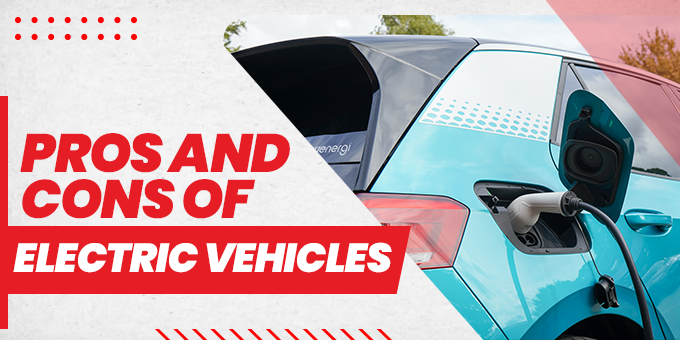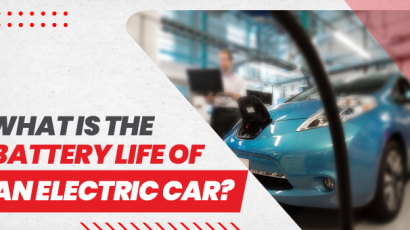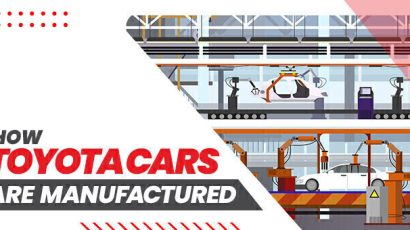
Technology is now diffused into every sphere of our lives, including the automobile industry. One of the biggest technological advancements in the automobile industry is electric vehicles. It has been making huge strides in the market.
However, drivers are still skeptical about the car’s efficiency, longevity, and performance and are hesitant to invest in them. Being one of the core components of an electric vehicle, car enthusiasts worry about the fact the battery of an EV can die down with time.
To clear out any misconceptions about electric cars, we’ll be discussing their benefits and shortcomings in this blog.
Pros of Electric Vehicles
Lower Carbon Prints and No Fuel Costs
The first and foremost attractive aspect of an electric vehicle is the electric–powered motors. Getting a car-free of gasoline is a reason enough for anyone to switch to an EV. The fact that one can save a stark amount from cutting back on gas becomes the key selling point of electric cars. As per Consumer Reports, one can save around $800-$1000 on their fuel costs.
Other than saving fuel costs, EVs are said to be more environment-friendly as they don’t require exhaust systems. As per a report by EPA, a gas-powered vehicle running at 22 miles per gallon emits 4.6 metric tons of carbon dioxide yearly. Compared to gasoline cars, EVs don’t emit fumes or greenhouse gases toxic to our environment and help us achieve cleaner air.
A Renewable Resource
Electric cars are powered by renewable resources such as solar, wind, and water energy. So, if your home is powered through renewable resources, then that makes you the best owner of an electric vehicle. They also ensure no emission of CO2 at any stage of their usage.
Furthermore, an electric vehicle requires far less cost to run than gasoline-powered cars. This is because they have an efficient regenerative braking system that enhances the car’s ability to run at its best.
Lesser Maintenance and On-Going Costs
The other promising aspect of EVs is that they have battery-powered motors, which means no more changing the oil or transmission fluid or any repairs that a traditional vehicle requires. Furthermore, an electric system wouldn’t require your mechanic to move several pieces of equipment for maintenance, which will help you save your money by a large margin.
A Smoother Driving Experience
Electric cars make little to no noise, which is why it was suggested to install a noisemaker in the engine of the car to make pedestrians aware of the car. In addition, they can convert around 60% of the energy into powering up the engine as compared to gasoline cars that convert around 20% of energy into vehicle movement.
Electric motors also offer seamless agility, optimal responsiveness, and high-quality performance that contribute towards a phenomenal driving experience.
Warranties
A report by Carfax says that the electric vehicle comes with warranties for a minimum of eight years or 100 thousand miles. For example, Kia provides a ten-year warranty, whereas Hyundai offers a lifetime warranty on all EV batteries. This leverages customer interest and willingness to invest in an electric vehicle.
The catch to these warranties is that manufacturers may offer them on the condition that batteries must be completely died down or have become completely incapable of holding their charging. An example of this is brands like BMW, Tesla, and Nissan, which cover the warranty of an EV’s battery if it has lost 60-70% of its capability.
Tax Credits and Other Benefits
The cherry on top for electric car owners is receiving tax credits and other local incentives just for owning an EV. You can get as much as $7000-$8000 in some states for specific makes and models of EVs. So, before investing in an electric vehicle, you can look up the incentives and tax credit you can get on it.
HOV Lanes
In addition to the benefits a state provides, an EV owner can also access the HOV (high occupancy vehicle) lane that allows them to bypass traffic. Now, drivers can save hours of being stuck in traffic and enjoy a comfortable ride.
Cons Of Electric Cars
Electric cars are still relatively new to the market and have much more room to improve and advance. One of the key factors that put off car enthusiasts from buying an EV is their battery life expectancy. Usually, an EV can run up to a maximum of 100 miles on full charging, whereas a gas-powered car runs up to 400 miles on a full tank.
The lithium-ion battery cells of an electric car do cope well with heat which is why the battery of EVs in hotter regions can be expected to deplete at a much faster rate. So, it is important that while buying an electric car, you ensure that it is equipped with a battery cooling pack.
Another factor that can shorten the lifespan of an EV’s battery is level 3 charging stations. While they promise a quicker battery charging, they also heat up the battery a lot, making them lose their power and cause them to deplete in the long run. So if your EV has found its way to a junkyard and you are looking for a Japanese used car in Mozambique, then head to our website and get cars at economical rates.
Time-Taking Battery Recharge
A gasoline-powered car’s tank can be filled in a matter of minutes, whereas an electric car can take about 20 hours to charge fully. Newer models of EVs, however, can be charged in four hours which is still longer than a traditional car would take to fill up. This drawback makes these cars not an ideal option for emergency situations.
For say, you have run an immediate errand or have an emergency situation come up, and there your car is sitting at 1% battery that will take hours to reach 50%. The saving grace for this situation is that EV owners have to charge stations in their garage to help them recharge their cars on the spot.
Higher Initial Costs
While EVs are becoming more affordable, they still have an initial price that makes a buyer think twice. From an approximate starting value of $30,000 that can rise up to $80,000 and more, the mainstream market will rather opt for a better and advanced model of a gasoline car.
However, as time passes, the gap between the price tags between EVs and gasoline-powered cars will more likely close.
Finding a Charging Station
Some countries have charging stations located nearby, whereas some have them at a distance. That makes road trips with electric cars a bit more difficult. The fact that you can’t carry your charging station around, the battery not lasting longer, and charging stations located far apart from each other makes people less and less enthusiastic about electric vehicles.
However, with automobile companies continuously working on improving the longevity of electric vehicles and states building more EV charging stations, this issue perhaps won’t be an issue in the upcoming years.
Lesser Options
Lastly, traditional cars have been in the market for more than ten decades which is why they are available in a wide range of makes and models. They have encompassed the market with their multi-purpose designs, which contributes to the reason due to which people still prefer them. In comparison, electric cars having a lesser history puts them at a disadvantage.











